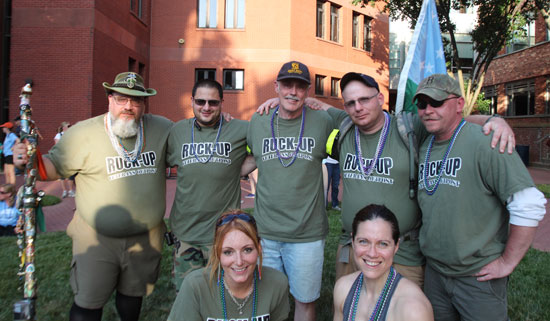By Chase Cook, News21

Top from left to right: Ruck Up members and veterans AJ Paige, Nicholas Leone, Don Spencer, Eddie Brown and John Pajak pose for a photo with team member (bottom) Sue Barton, and Miles for Military team member and veteran Angie Guss. They participated in the Out of the Darkness Overnight Walk in Washington, D.C. to raise money for suicide prevention efforts, which attracted about 1700 walkers and 300 volunteers. (Photo by Chase Cook, News21)
With the flag of the Green Mountain Boys — the Vermont National Guard — tucked into the straps of his backpack, Eddie Brown stands among fellow veterans awaiting their 16-mile walk.
Brown is part of the Ruck Up team, Veterans who have served in Panama, Macedonia, Bosnia, Iraq and Afghanistan. They all are in the Out of the Darkness Overnight Walk to remember service members who died by suicide and to support veterans struggling with mental illnesses.
An estimated 22 veterans commit suicide a day, according to a February report by the Department of Veterans Affairs. Three of Brown’s comrades-in-arms have committed suicide since his last deployment three years ago.
Brown and other veterans say that one of the main reasons for suicide is a disconnect between those who fight and those who don’t.
“I hate to put this stereotype out there, but civilians don’t understand us,” Brown said. “We are our own little community, brotherhood.”
The Ruck Up team of five veterans came together for the overnight walk to not only remember the fallen, but to remind non-veterans that a community fought for their country and some now feel abandoned or lost among those they swore to protect. Ruck Up teamed with Miles for Military, which featured family members of servicemen, women and veterans who have committed suicide.
The walk took the two groups throughout downtown Washington, D.C., passing the Lincoln Memorial, Washington Monument and other historical sites as they completed the 16-mile journey. They began at 7:30 p.m., and crossed the finish line around 4 a.m.
AJ Paige, a Panama and Gulf War veteran, walked for his fellow rangers who committed suicide. Paige thinks the estimated number — 22 veterans committing suicide a day — is higher. Veterans back from deployment are cast into the world without their battalion, their unit, their platoon, Paige said.
“The day you discharge, you are the most lonely person in the world,” he said. “It is like being cut off. It takes a long time for folks to realize they are not alone.”
One of the ways non-veterans and others can help veterans struggling with suicidal thoughts is to listen, those in the group said.
“We are not strange. We are not mutants. We are your brothers, your sons, your sisters, your moms, your dads and we aren’t any different than when we left, but we’re scarred,” Paige said. “If people aren’t willing to deal with that, we are going to continue getting lost.”
If you or a loved one know a military service member or veteran in emotional distress, please call the Veterans Crisis Line at 800-273-8255 (Press 1).
